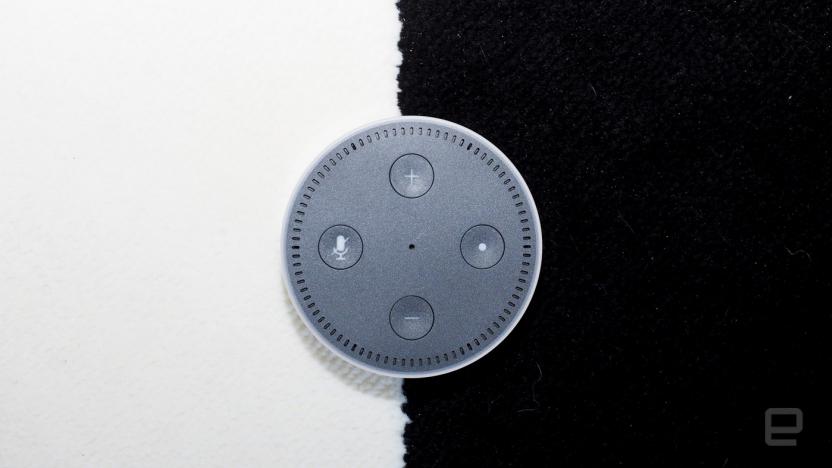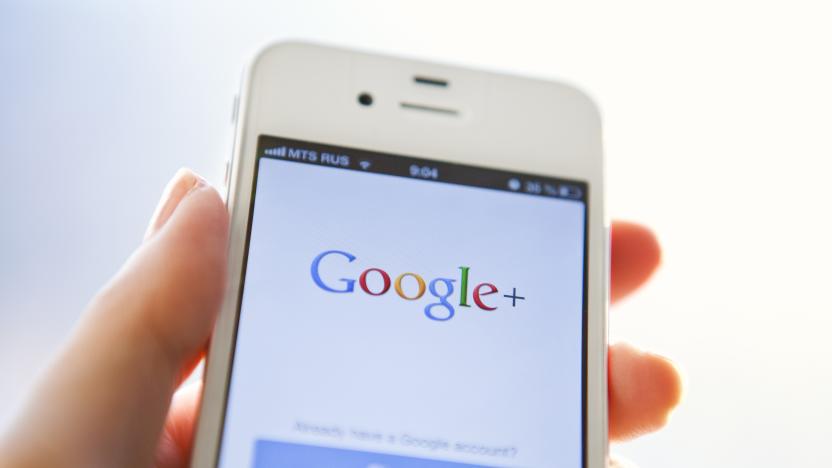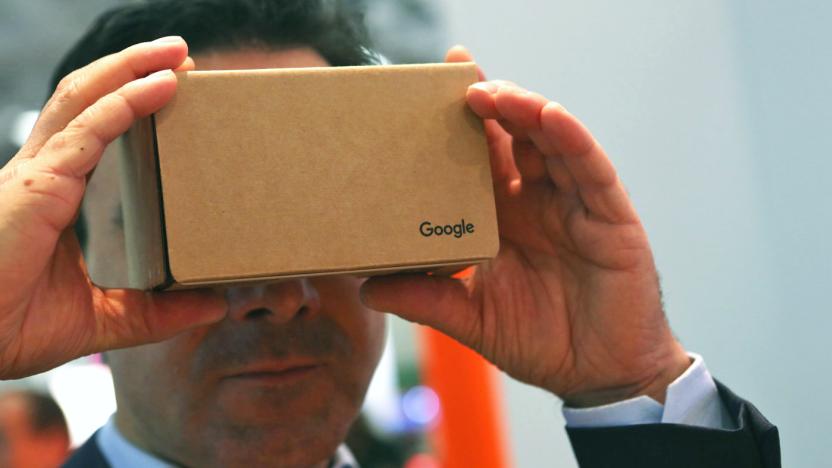hardware
Latest

Magic Leap One: All the things we still don’t know
It's that time of year again: the special season when everybody's favorite mythical creature makes its annual appearance. That's right, it's Magic Leap hardware teaser season! Seemingly once a year, the secretive startup reveals what it's been up to, and on Wednesday it revealed renderings of its latest AR headset prototype. The company even deigned to allow a Rolling Stone reporter to take the system for a spin. But for everything that Magic Leap showed off, the demonstrations and teaser materials still raise as many questions as they answer. There's a whole lot about the Magic Leap system that we don't know, so maybe let's hold off on losing our minds about the perceived imminent AR revolution until we do.

Google wants to help developers make better websites
Developers already have access to a number of tools that let them see how real-world users experience their websites, but until now they weren't able to see how their website user experience compared to others. Enter the Chrome User Experience Report, a public dataset of key user experience metrics gleaned from Chrome users who have opted in to usage statistic reporting.

Amazon is 'doubling down' on the Echo ecosystem
Amazon is off to a profitable start in 2017. The company's first-quarter sales jumped 23 percent to $35.7 billion, beating analyst expectations, and top executives pinned part of that spike on the Alexa ecosystem. "We're very encouraged by the customer response to Echo products," one exec said during Amazon's financial call today. "Not only the products, but the ability now to use tablets as Echo devices, since we spread the Alexa technology to many of those devices. We're also happy with the success we've had with developers; there are now more than 12,000 Alexa skills, so we think that's all foundational."

Apple fills new hardware team with ex-Google satellite execs
Apple has hired two people with intriguing backgrounds in the field of satellite technology: John Fenwick, the former head of Google's spacecraft business, and Michael Trela, the ex-lead of Google's satellite engineering group. Bloomberg reports the hires, citing people familiar with the matter.

Facebook details its plans for a brain-computer interface
Facebook wants you to use your brain to interact with your computer. Specifically, instead of using something primitive like a screen or a controller, the company is looking into ways that you and I can interact with our PCs or phones just by using our mind. Regina Dugan, the head of Building 8, the company's secretive hardware R&D division, delved into this on stage at F8. "What if you could type directly from your brain?" she asks.

Engadget's first thoughts on the Nintendo Switch
We now know that Nintendo's next-generation game console will be the Switch, a hybrid device offering portable and home gaming in one. But there's a lot we don't know. What games will it launch with? How much it will cost? What's that screen like? Will it play games on a TV at 1080p? How long will the battery last? We'll find out more about the Switch before its March 2017 release, and the answers to those questions, and more, will likely dictate our overall judgement. Nonetheless, we're nothing if not opinionated, and seeing Nintendo launch a new console has got us talking. So without further ado, here are eight Engadget editors with their first take* on the Switch. *Other opinions are also valid.

Google will sell its own Daydream VR headset
When Google developed its popular line of Nexus phones and tablets, it didn't just give the reference designs to third parties and hope for the best: It built and sold its own hardware to showcase just what those designs could achieve. The company announced on Thursday that it will take the same tack with its newly unveiled Daydream VR hardware. That's right, Google is going to build its own line of Daydream headsets and controllers to show third-party developers how it's done.

Google grabs ex-Motorola president to unify its hardware groups
Rick Osterloh, former president of Motorola, is now Senior Vice President at Google in charge of a new hardware division that includes the company's Nexus devices, living room gadgets and Glass, Re/code reports. This means Nest CEO Tony Fadell is no longer leading Google's Glass initiatives, a role he took on in January 2015, though he'll stay on as a team adviser. Osterloh is no stranger to Google -- he led product development during Motorola's tenure under Google and helped develop the Moto X, Moto 360 and early Droid efforts.

Magic Instruments' digital guitar makes it easy for anyone to jam
Magic Instruments co-founder and CEO Brian Fan knows the pain of learning new instruments. A Juilliard-trained pianist before starting his own company, he spent years trying to learn the guitar, only to put it down after realizing that all his previous work didn't help him suck any less. What young, would-be rocker hasn't been there? His version of rising to the challenge was a little different than you might think though. Rather than dedicating another chunk of his life to mastering the basics, Fan dedicated a chunk of his life to building a new kind of guitar. He calls his $299 Bluetooth-connected brainchild a "digital rhythm guitar," and its raison d'etre is to let anyone to feel the thrill of playing music.

WSJ: Google is working on a standalone VR headset, too
Clues have been circulating about Google's plans for a new VR headset in recent weeks. Now, the Wall Street Journal reports that Mountain View is working on a second virtual reality device. Unlike the headset we've seen tipped already, the second gadget is said to be a standalone unit that doesn't require a phone or PC in order to work. If this is true, it will be the first device to function without being connected to a computer or mobile device. A few days ago, a report surfaced stating that Google had a new headset in the works that would be a much more advanced version of Cardboard, but would still use a handset to drive the visuals.

Ultrasound and software could replace a phone's proximity sensor
Smartphone makers are obsessed with making their gear thinner, and Norwegian startup Elliptic Labs has come up with a pretty good way to help. Their answer: get rid of the proximity sensors in our phones (and the requisite dark dots near our screens) entirely. Instead, Elliptic CEO Laila Danielsen says her team has developed some clever software that uses a phone's existing speaker and microphone to do the same job.

Facebook makes the hardware it uses for AI open-source
You might not think of it often, but behind the scenes Facebook uses a lot of artificial intelligence. The company leans heavy on AI, using machine learning to curate a better news feed, sort through photo and video content and even read stories or play games. Now, the company is making Big Sur, the hardware it runs its AI experiments on, open-source.

Former Android boss Andy Rubin could be coming back to phones
It's been a little bit over a year since former Android boss Andy Rubin left Google entirely to start a hardware startup incubator called Playground Global. Now, it sounds like Rubin is going to get back in the Android game, albeit indirectly. A report from The Information claims that Rubin is trying to recruit people to start a new smartphone company, likely funded through Playground Global. It's not clear if Rubin would be an advisor or play a more active role in managing and operating the company, but either way his vast experience with Android would be helpful for a new hardware company trying to get off the ground.

3-atom-thick transistor promises ultrathin electronics
Researchers from Cornell University announced a breakthrough in transistor technology in the latest issue of the journal, Nature. The team has reportedly developed a novel and highly efficient method of producing an experimental material known as transition metal dichalcogenide (TMD). TMD is an exceedingly thin (but highly conductive) film, which makes it useful in many high-tech applications -- everything from solar cells to flexible, wearable gadgets -- but also makes it a huge pain to produce in appreciable quantities. That is, until now.

Hardware, not hackers, behind US Postal Service's computer woes
The United States Postal Service had a little trouble installing some hardware yesterday, and now it's feeling the burn - the service's email system remains on the fritz while "some services offered at retail offices" have been affected to boot. Here's what you need to know: The USPS has battled snow and rain and heat and gloom of night, and a systems outage like this hasn't really slowed it down any. Mail deliveries are continuing as usual, as are mail scanning and processing procedures so your letters are currently flowing through their tubes same as always.

OnKol captures your loved ones' health data so you don't have to
Distance can sour even the fondest familial relationships, and they're even trickier to sustain when health issues are involved. That's where a small, Midwestern hardware startup called OnKol comes in -- it's making a handsome hub for all the digital health data you can squeeze out of compatible health monitors (a decent chunk of which have cables that terminate in USB jacks). It'll also play nice with health devices that support Bluetooth connections, though those can be a little tougher to come by. The end result? A sort of one-stop shop to help you keep tabs on loved ones who could use some remote (but caring!) eyes.

Original Kinect for Windows being phased out next year
Microsoft will phase out sales for the original Kinect for Windows in 2015. The decision follows the arrival of the sensor's second version and PC adapter in October, as well as the latest hardware's SDK being made freely available. The company noted in an announcement blog that companies reliant on the original motion sensor should contact Microsoft soon to fill orders for the older hardware, though "no more original sensors will be manufactured after the current stock sells out." Version 2 of Kinect for Windows is essentially the same tech paired with the Xbox One when Microsoft's latest home console launched in November 2013, save for two changes: Microsoft pulled the Xbox logo from the camera and added a separate hub and power supply to operate. Microsoft's PC adapter for the Xbox One Kinect links the new camera to Windows 8 machines using USB 3.0 for $50. The original Kinect for Windows hardware launched in February 2012. [Image: Microsoft]

The Puzlook iPhone case combines a puzzle and photography
Well here's something that's...unique. The Puzlook iPhone case contains five lenses to your iPhone to enhance your photography, including wide-angle, macro, telephoto, and fisheye lenses. There's also a tripod mount an integrated 8 GB USB memory stick. What's weird is that the lenses are configured like a sliding tile puzzle. To use the one you're after, you must "solve" it into place. I realize it's just a five-piece puzzle on a six-slot board, so it isn't exactly difficult. But I suspect the novelty would wear off very quickly. But what do I know? The Puzlook is available for the iPhone 5 and 5s only, with a price tag of US$99.

Five products from 2014 I can't live without: Steve Sande
Of all of the staff at TUAW, I'm probably the guy who gets to take a look at more hardware and accessories than anyone else. Let's face it, being the hardware review editor has both its rewards -- getting to see a lot of amazing products -- and its downfalls -- having to review some really crappy accessories. Here's a look at five products from the past year that truly changed the way I work and play. Logitech Keys-To-Go Keyboard (US$69.99) As a writer, keyboards are the interface between what's brewing in my brain and what gets published online or in books. I tend to be very particular about keyboards, wanting a specific feel and key layout when I do my work. Well, Logitech did the impossible in 2014, coming out with an inexpensive Bluetooth keyboard that works equally well on iPhone, iPad, and Mac. The Keys-To-Go keyboard weighs just 6 ounces and is less than a quarter-inch (6 mm) thick, making it a great mobile or spare keyboard. Oh, yeah -- it uses Logitech's spill-resistant FabricSkin technology, so me spilling a beer on it is much less likely to send it to the island of destroyed keyboards. Logitech Type+ Bluetooth Keyboard for iPad Air (US$99.99) Yeah, I spent a lot of money on Logitech keyboards this year. My go-to iPad Air keyboard case is the Logitech Type+. This thing has an amazing keyboard feel, it's thin, and would you believe that I've only charged it once in the time that I've had it? My only gripe after a few months of use is that the bright red exterior cloth is starting to get a little grimy, but considering the amount of use it gets, I can live with that. In case you're looking for a photo of this keyboard folio case, that's it at the top of this article. Cambridge Audio Bluetone 100 Speaker (US$299.99) If you talk to my boss soon, tell him I need a raise. That's because when I review a product that's truly incredible, I need to go out and buy it for myself. That was the case with the Cambridge Audio Bluetone 100, a 100 Watt Bluetooth speaker that redefines desktop audio systems. Offering rock-solid Bluetooth connectivity, incredible room-filling sound, and a classic design, the Bluetone 100 is a winner. You will not feel bad about spending three Ben Franklins for this speaker. Olloclip 4-in-1 Photo Lens for iPhone 6/6 Plus (US$79.99) The camera in the iPhone 6 and 6 Plus is so good that I find myself using it for a growing number of photos, both those taken for personal use and even for TUAW reviews. But the built-in lens of the iPhone 6 Plus (in my case) sometimes lacks in terms of field of view or the ability to take amazingly sharp macro shots. That's where the latest version of Olloclip's 4-in-1 Photo Lens comes into play. Offering two macro lenses, a wide-angle lens and a fisheye lens in a lightweight package, the 4-in-1 is also much easier to carry around now that Olloclip provides a plastic clip and lanyard so you can keep the lenses close at hand around your neck. Apple iPhone 6 Plus (price varies with plan and capacity) I have owned every iPhone model since the original, and the iPhone 6 Plus is my favorite so far. The screen is big and beautiful, the speaker is actually loud enough to hear, and Apple Pay? I use it every chance I get. Does this mean that I won't jump to an iPhone 7 when they show up? Heck no. But at this juncture in time, the Apple iPhone 6 and 6 Plus are absolutely the best smartphones on the planet, and sales over the past few months prove that point. For many years, I've told people to just wait a year or so to get an upgrade if they really don't need one -- the iPhone 6 and especially the iPhone 6 Plus are worth paying your carrier's early termination fee and upgrading to.

The Audioengine B2 Bluetooth speaker has premium sound
There are oh so many Bluetooth speakers out there. Little plastic ones that sound tinny, larger battery-operated speakers that you can take with you and improve the sound quality. In a departure from the small and the portable is this new speaker from Audioengine (US$299.00). The company, which has impressed many audiophiles with monitor speakers like the A5+ and the A2+ systems, is getting into wireless speakers in a big way. This B2 speaker is a one-piece unit with similar internals to the A2+. No battery, no handle, just good clean sound from your iPhone or iPad. Design The Audioengine B2 is an attractive speaker available in a variety of colors and finishes. It weighs 10 pounds and features a 60W peak total amp (30W per channel). The single piece stereo array features two 2.75" Kevlar woofers and a pair of 34" Silk dome tweeters. It supports Bluetooth 4.0 audio and the aptX codec for higher quality sound (more about aptX later.) The packaging is first class. Accessories and the speakers are packed in plush cloth bags with a drawstring. Functionality Setting the speaker up is easy. Screw in the antenna, turn it on and the B2 is in pairing mode. Bring up your iPhone or any Bluetooth capable device and pair it to the B2. Sound Sound is subjective, but I found the Audioengine neutral with a solid low end. Range was good. Audioengine specifies 100 feet, and no matter where I moved in the house the signal stayed solid. The unit itself is noiseless, and with my ear up to the speaker with no input I could not hear any hum or hiss. The Audioengine bettered all the little Bluetooth speakers I have traveled with, and while my Bose Soundlink Bluetooth speaker sounds very good, I thought the AudioEngine bested it, but for a third more dollars. I listened to classical strings, some Miles Davis and the new soundtrack to the Interstellar movie which has some deep organ notes. Everything sounded clean and pleasant. The speaker doesn't have really extended highs, but generally most small speakers don't. The bass held up very well without getting muddy. Conclusion The Audioengine is not a portable travel speaker system. It it doesn't feature battery power, and is large enough that you won't pack it for travel. But its size is the good feature here, not a negative. It has a solid stereo sound that would be great for a bedroom or an office desk. It's very well built. I always test the volume controls on audio equipment to see if they feel solid, and the Audioengine is obviously a high quality unit. No spurious noises, a lovely finish and concise documentation make it a great package. The only negative is iOS itself. It only supports Bluetooth 4.0, while many Apple competitors support the higher quality aptX codec. Apple is behind here. Very much behind.











